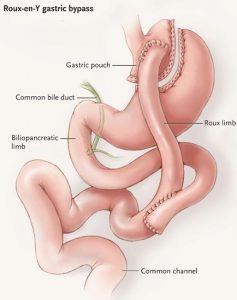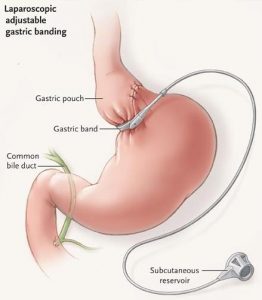
If you’re obese, you’re not alone: more than one-third of American adults are morbidly obese – increasing their risk for diabetes, heart disease, stroke and other serious conditions, while keeping them from the active and happy life they deserve.
Our Bariatric Surgery Program offers highly effective surgical options to put you on the path to success. Our board-certified weight-loss surgeons specialize in the latest minimally invasive techniques, giving you the best possible start on your journey. And with a caring team of dietitians, mental health providers, bariatric-trained nurses and other specialists, we’ll be with you every step of the way.
| We offer: Vertical Sleeve Gastrectomy Surgery Roux-en-Y Gastric Bypass Surgery | Gastric Band Management Revisional Surgery |
Bariatric Surgery Approaches
We are highly skilled and experienced in minimally invasive surgical techniques, including laparoscopic and robotic-assisted bariatric surgery.
Robotic-Assisted Surgery
Robotic-assisted surgery enables the surgeon to have increased precision and control, especially for more complex cases. To operate the FDA-approved da Vinci ® Surgical System , your surgeon makes tiny incisions in your body and inserts miniaturized instruments and a high-definition three-dimensional camera. Then, from a nearby console, your surgeon manipulates those instruments to perform the operation.
During a robotic-assisted procedure, your surgeon uses master controls to manipulate the instruments, which translate your surgeon’s movements into precise movements inside your body. Your surgeon is in control the whole time; the surgical system responds to the direction he/she provides. Robotic-assisted bariatric surgery may offer many benefits including:
- Potential for fewer complications for certain individuals
- Less pain and scarring
- Small incisions
- Lower risk of infection rates
- A shorter hospital stay
- The ability to use small incisions for complex cases
Laparoscopic Surgery
As an alternative to open surgery, Laparoscopic Bariatric Surgery (minimally invasive surgery) allows your surgeon to use techniques that limit the size and number of incisions. It’s typically considered safer than open surgery. You’ll usually recover more quickly, spend less time in the hospital, and feel more comfortable while you heal. Other benefits include:
- Less post-operative pain
- Shorter hospital stays
- A reduced rate of infection
- Less blood loss
- Smaller scars
Vertical Sleeve Gastrectomy
The vertical sleeve gastrectomy, otherwise known as ‘the sleeve’, is a procedure that makes the size of the stomach smaller. This limits the amount of food you can eat, so you are fuller faster. It also affects certain hormones in the body that affect our hunger, so in general your appetite is suppressed. This surgery is non-reversible.
Advantages:
- Reduction in portion size
- Reduction in hunger
- Decreased chance of malabsorption and nutritional deficiency
- No dumping syndrome
- Improvement or resolution of medical problems related to obesity
Disadvantages:
- Gastro-esophageal reflux disease (GERD)
- Stricture or narrowing of the sleeve
- Ulcers, particularly from NSAID use or smoking

Roux-en-Y Gastric Bypass
With gastric bypass surgery, a small stomach pouch is created from your normal stomach. This ‘pouch’ is where your food will go once you swallow it. The pouch is connected to a segment of your intestines so that your food ‘bypasses’ the majority of your remaining stomach (‘remnant stomach’) and the first portion of your small intestines. This means that you will have some malabsorption of some vitamins and minerals. Gastric bypass helps with weight loss because of restriction (small stomach), hormone changes (changing your hunger) and malabsorption.
Advantages:
- Reduction in portion size
- Reduction in hunger
- Improvement or resolution of medical problems related to obesity
Disadvantages:
- Dumping syndrome
- Malabsorption can lead to poor absorption of iron, calcium and B vitamins
- Ulcers from smoking or NSAID use
- Strictures at the intestine connections
- Change in the absorption of certain medications

Gastric Band Management
The LAP-BAND is an adjustable silicone band placed on the top portion of the stomach that is attached to a port to restrict food intake. We do not insert gastric bands in patients, but we do manage them for patients who are happy with them. We also remove them for those patients having issues with them.
Revisional Surgery
Revisional surgeries are surgeries performed on patients who have had previous bariatric surgery. Common indications for revisional operations include complications such as ulcers, fistulas, hiatal hernias, uncontrolled reflux or issues with lap-bands. Revisional surgeries are more complex and carry increased risk compared to original bariatric surgeries. Your surgeon will carefully evaluate you and your history to determine if you need revisional surgery.
